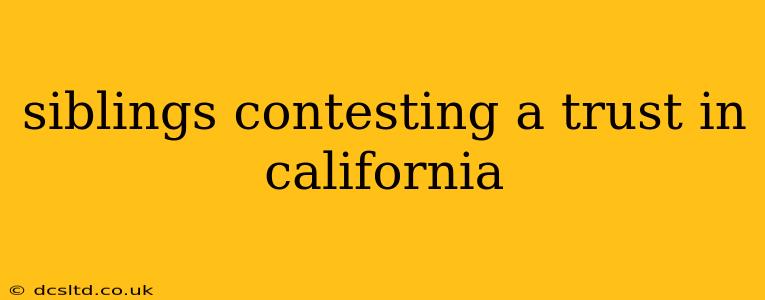Contesting a trust in California can be a complex and emotionally charged process, particularly when siblings are involved. Disagreements over inheritance can fracture family relationships and lead to protracted legal battles. This guide provides a comprehensive overview of the process, addressing common questions and concerns. Understanding your rights and options is crucial in navigating this difficult terrain.
What are the grounds for contesting a trust in California?
California law allows for challenges to a trust under specific circumstances. Grounds for contesting a trust typically involve allegations of:
- Lack of capacity: The testator (the person who created the trust) lacked the mental capacity to understand the nature of their actions when executing the trust. This requires demonstrating the testator suffered from a cognitive impairment that prevented them from comprehending the document's implications.
- Undue influence: Someone exerted undue influence over the testator, compelling them to create or modify the trust against their true wishes. This often involves evidence of coercion, manipulation, or exploitation of a vulnerable individual.
- Fraud: The trust was created or modified through fraudulent misrepresentation or deceit. This might involve concealing vital information or making false promises to manipulate the testator.
- Mistake: A mistake was made in the drafting or execution of the trust, leading to an unintended distribution of assets. This is a more difficult ground to prove and often requires clear evidence of a clerical error or misunderstanding.
How do I prove undue influence in a trust contest?
Proving undue influence requires demonstrating that:
- The testator was susceptible to undue influence (e.g., due to age, illness, or dependence on the influencer).
- The influencer had the opportunity to exert undue influence.
- The influencer had the disposition to exert undue influence.
- The result was the creation or modification of the trust that didn't reflect the testator's true wishes.
Evidence may include witness testimony, financial records, emails, and medical evaluations. The burden of proof lies with the party contesting the trust.
What are the typical costs involved in contesting a trust?
Contesting a trust can be expensive. Costs can include attorney fees, expert witness fees (e.g., medical experts, financial experts), court filing fees, and other litigation expenses. These costs can quickly escalate, making it crucial to carefully consider the potential benefits versus the financial risks.
What is the likely outcome of a trust contest?
The outcome of a trust contest is uncertain and depends on various factors, including the strength of the evidence, the credibility of witnesses, and the judge's interpretation of the law. Even with strong evidence, there's no guarantee of success. Mediation or settlement negotiations may offer a more cost-effective and less adversarial alternative to a full-blown trial.
Can siblings agree to settle a trust dispute out of court?
Yes, siblings can agree to settle their differences out of court through mediation or negotiation. This approach can often be more amicable and cost-effective than litigation. A skilled mediator can help siblings reach a mutually agreeable resolution that preserves family relationships while addressing their concerns.
What if one sibling is contesting the trust, and the others aren't?
If one sibling contests the trust while others accept its terms, the contesting sibling bears the burden of proving their case. The other siblings may choose to remain neutral or even support the trust's validity. Their positions can impact the outcome of the case.
How long does a trust contest take in California?
The duration of a trust contest varies significantly depending on the complexity of the case, the amount of discovery involved, and the court's docket. Cases can range from a few months to several years.
What are the potential consequences of losing a trust contest?
Losing a trust contest can result in substantial legal fees and the loss of potential inheritance. It can also damage family relationships beyond repair. Therefore, careful consideration and thorough investigation before initiating a contest are essential.
This information is for educational purposes only and should not be considered legal advice. If you are involved in a trust contest, it is crucial to consult with a qualified California estate attorney to discuss your specific situation and understand your legal rights and options. They can provide tailored guidance based on the unique circumstances of your case.
